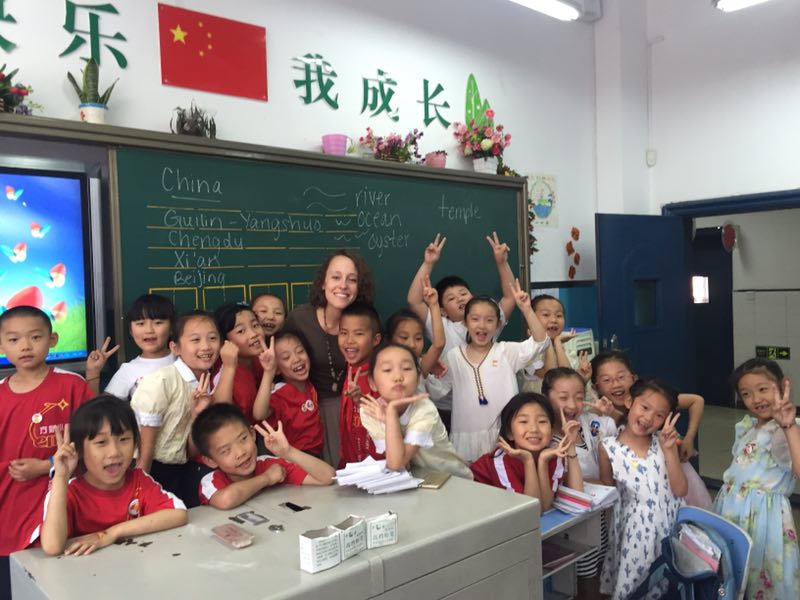Reflecting on a Year in China

It’s hard to believe my time as a laowai (foreigner) in China has come to an end. What an incredible time it has been. From experiencing the rich, unique culture to teaching 1,200 young Chinese students every week, I'm so thankful for these experiences. I wouldn’t have traded my time here for anything else.

In a year, a whole lot has happened. I’ve biked on a thousand year-old city wall. I’ve seen the famous Chengdu pandas. I’ve eaten pig's feet and cow's stomach. I’ve improved my chopstick skills. I’ve attended a Chinese wedding. I’ve experienced hot pot. I’ve bartered in broken Chinese. I’ve learned tai chi. I’ve visited numerous museums and seen artifacts from ancient Chinese dynasties. I’ve made dumplings. I’ve temple hopped. I’ve KTV’d the night away. I’ve hiked one of the Five Great Mountains in China. I've walked on the Great Wall. I've visited the Terracotta Warriors. I’ve rescued and fostered the sweetest puppy. I’ve met and taught 1,200 wonderfully bright students. I’ve gotten to know some of the kindest, most wonderful people.
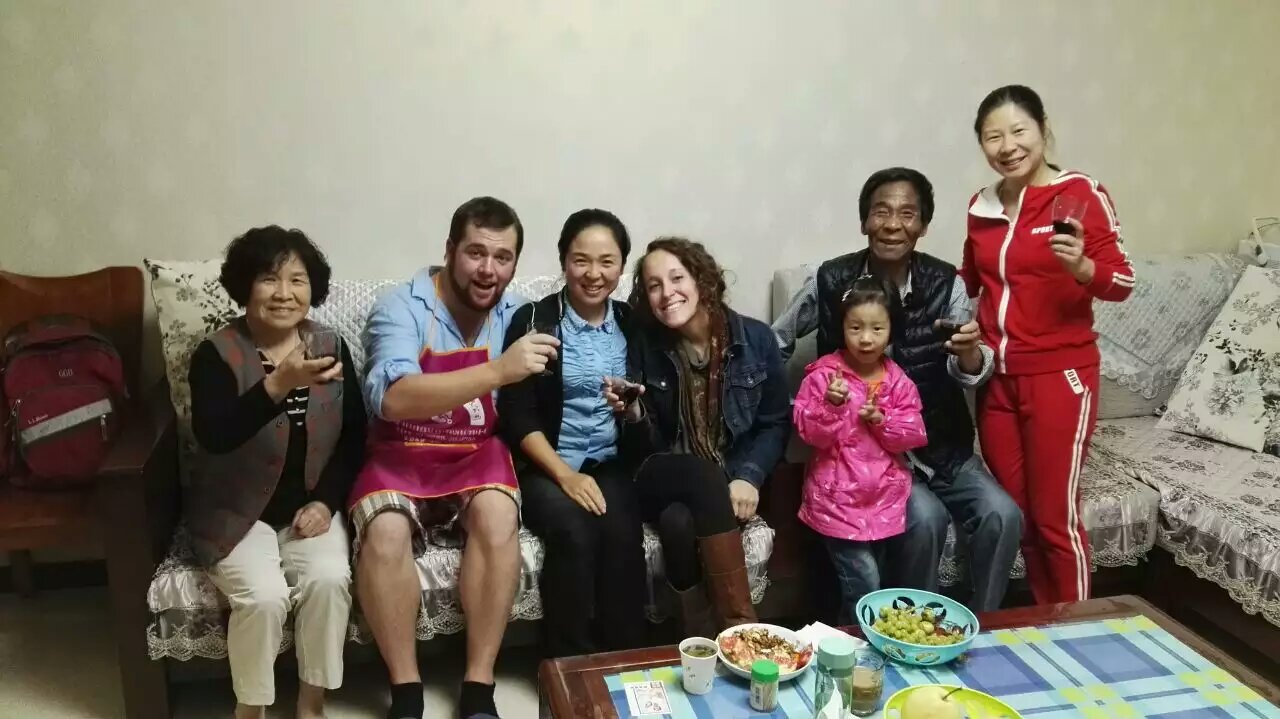
In a year, a whole lot has changed. I’ve learned a tiny bit of Mandarin (hey, numbers and random food count for something, right?). I’ve gotten really good at miming and using hand gestures to communicate. I’ve learned to be more flexible (because things in China are almost always done last minute). I've learned that teaching young children English is the most challenging and frustrating, yet rewarding and exciting job you could ever have. I’ve become more adventurous (unless you can read Chinese, you don’t know what you’re eating most of the time). I’ve learned to not take things too seriously (if a Chinese person tells me I “don’t look beautiful today” it’s not to be taken offensively).
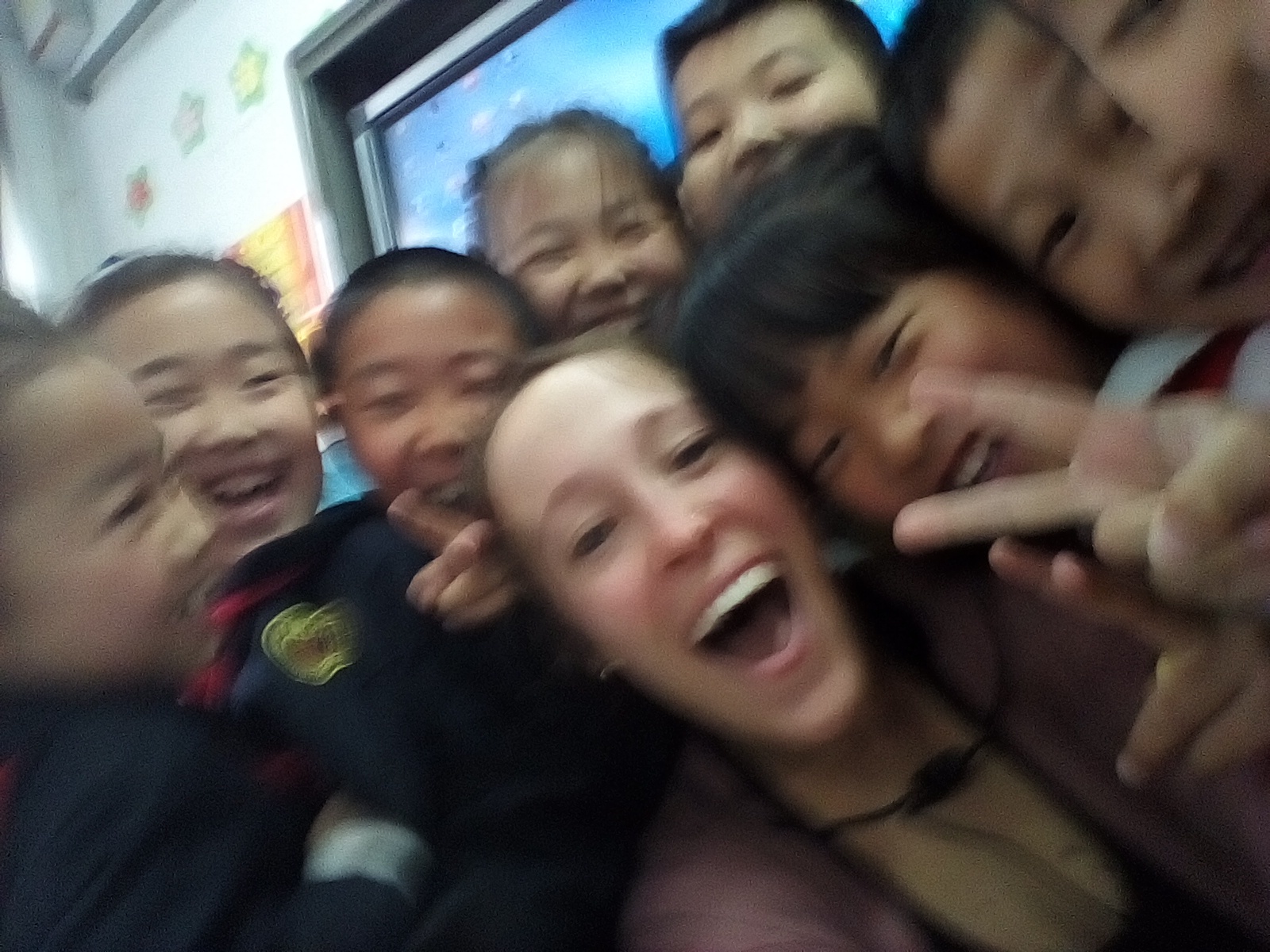
What have I learned about China? A whole lot too.
Communication Styles
In the Western world, equality is the name of the game. Particularly in the workplace, everyone has equal right to speak their mind and offer ways to improve their work environment. Here, hierarchy is the name of the game. Teachers would never speak up to the leaders or headmaster of our school. Even when the administration tells them to do tasks incredibly last minute or makes them change a project they’ve spent days and days working on, no one refuses or talks back. Everyone knows their place and is aware of everyone else’s.
I’m not going to lie, this was something that was extremely difficult for Justin and I, especially with the last minuteness and (what we felt like was a complete) disregard for our time. We’d spend hours working on a project (like the tai chi routine or a lesson for an important teaching festival) only to find the leaders didn’t like what we did and wanted our work completely changed. We had to learn to take a deep breath, smile, and just do what we were told.
Solving the root of any problem is often circled around and confronting someone is almost entirely avoided. This is because the concept of “saving face” is very important in Chinese culture. They would much rather avoid a problem with someone than address them directly.
Another big cultural difference is the Chinese tendency to “tell it like it is.” Chinese people have no problem telling you you’re too fat, too thin, not clever, or not beautiful. Like most Asian countries, Chinese people believe that if you’re light-skinned and thin, you’re beautiful. Anything that strays from this idea is considered “not beautiful” in their eyes.
At first, this seemed rude to us. We didn’t like walking into the office Monday morning to hear our fellow colleagues commenting on our appearance. But, after some time, we thought, “Hey, maybe we need to lighten up a little more.” We learned the comments weren’t to be taken seriously and laughed it off together.
Way of Life
Where to begin? So many interesting differences here.
The not so good?
Babies often don’t wear diapers and, instead, wear pants with slits in the bum so their parents can simply hold them over a gutter if they need to go to the bathroom. Not super sanitary, but on the plus side, parents must save a fortune on diapers.
Drivers are all... offense. Drivers rarely use blinkers, they overuse their horns, and they weave in and out of lanes like no tomorrow. Thankfully we didn't get in any accidents and we only witnessed one. Considering Chinese people need to take four different tests to receive their driver's license, maybe they're better drivers than we are...
The concept of waiting in lines is not a thing. From waiting for a ticket to a cultural site to weighing fruit and vegetables at the market, everyone will gather in a big bunch and push their way to the front. Organized lines just don't happen, and if you think they will, you'll be stuck in the same line forever while everyone pushes past you.
Chinese women are expected to be married before they’re 30 years-old. If they aren’t, they’re considered “odd.” If a young lady isn’t in a relationship, her friends, colleagues, and family will constantly ask if she has a boyfriend or even try to set her up with someone. I remember having a conversation with some university students about how much pressure they felt from their parents to “find a good job” so they could “find a good husband.” The prospect of a “good job” meant nothing for themselves as individuals; their family just wanted them to find someone to marry.
The air quality can be hazardous, especially in large cities. Before coming to China, I knew it was a problem, but after living here for a year, I didn't realize how bad it really was. The winter months are the worst— there were times when school was even canceled because of the record-high pollution levels.
The internet is censored. While most people know this about China, as a foreigner living here, this can be incredibly frustrating. Everything from Google and Facebook to Youtube and Instagram is blocked. You need a reliable VPN (Virtual Private Network) to bypass the "Great Chinese Firewall" and use these sites. Sometimes VPN's don't even cut it, which makes for chatting with friends and family back home quite difficult.
The great?

Family is everything. It’s common for families to live in the same general area, or often with one another. There’s a very strong parental concern for children too. Someone told us that about 40% of a family’s income is spent solely on their children. I’m not sure how accurate that statistic is, but it’s very telling to how important children are here. In the long-run, this leads to closer life-long relationships between parents and children.
Grandparents have an influential part in their children and grandchildren’s lives. More often than not, you’ll see a toddler holding hands with his or her grandparent on an afternoon stroll, rather than their parent. Children have great respect for their elders because of this.
Chinese people are incredibly generous. I can't even begin to count the amount of times we've been taken out to dinner, had a home-cooked meal in, been taken to a cultural site, given a thoughtful gift, or just helped out on the street. Chinese people are so thoughtful and kind— they never expect anything in return.
Meals out or in the home are almost always communal. There are typically a bunch of dishes in the center of the table that everyone eats from. This makes for a much more pleasant dining experience, as everyone takes their time, chats with one another, and enjoys the same food together.
Tradition is very important, particularly with major holidays like the Chinese New Year and the Mid-Autumn Festival. There are so many rich cultural traditions that happen every single year involving family, history, and food.
National pride is strong. Chinese people believe they are one of the greatest nations in the world. Their advancements in medicine, military, education, economy, and renewable energy speaks to, on the whole, a fine-tuned machine.
As a foreigner, you’re treated as both a celebrity and a zoo animal (a great and a not-so-great concept, depending on how you feel about it). Chinese people will point at you, gawk at you, stare at you, and call you a laowai (foreigner) or a Meiguo ren (American person). Some will even touch you— Justin has had his beard stroked more than once. They’ll often pretend to take “selfies” of themselves when they’re really trying to sneak a photo of you. While humorous at first, this gets old... fast. We had to remind ourselves that, for a lot of people in China, seeing a foreigner isn’t an every day thing. In America, we’re familiar with diversity— our country wouldn’t exist without it. But here, there is very little diversity, so when someone takes such an interest in you, it’s really just that. They’re genuinely fascinated by someone who looks, speaks, and acts differently than they do.
Everything is crazy cheap. Compared to the United States, that is. Justin and I could go to a really nice Chinese restaurant and feast for less than $15 between the two of us. We could get two-hour long massages for $20 each. I could get my hair cut for $5. Plus, tipping generally isn't expected. Needless to say, we saved big here.
Health
Chinese people have firm beliefs on what is healthy and what isn’t. If you have anything from a cold to a stomach bug, they’ll say you’re sick because you either drank cold water or didn’t wear enough warm clothes. They’ll recommend drinking hot water to cure most ailments, too.
When it comes to nutrition, Chinese people believe if a meal doesn’t include rice or noodles, it isn’t a balanced meal. When we were doing our Whole30 challenge, our colleagues in the English department thought we were insane. They’d say, “No rice? No noodles? No bread? What do you eat?!”
For this reason, foods are very symbolic. Rice brings fertility; noodles are thought to ensure a long life; whole fish represent luck and prosperity; sweet sticky rice cakes symbolize a rich, sweet life.
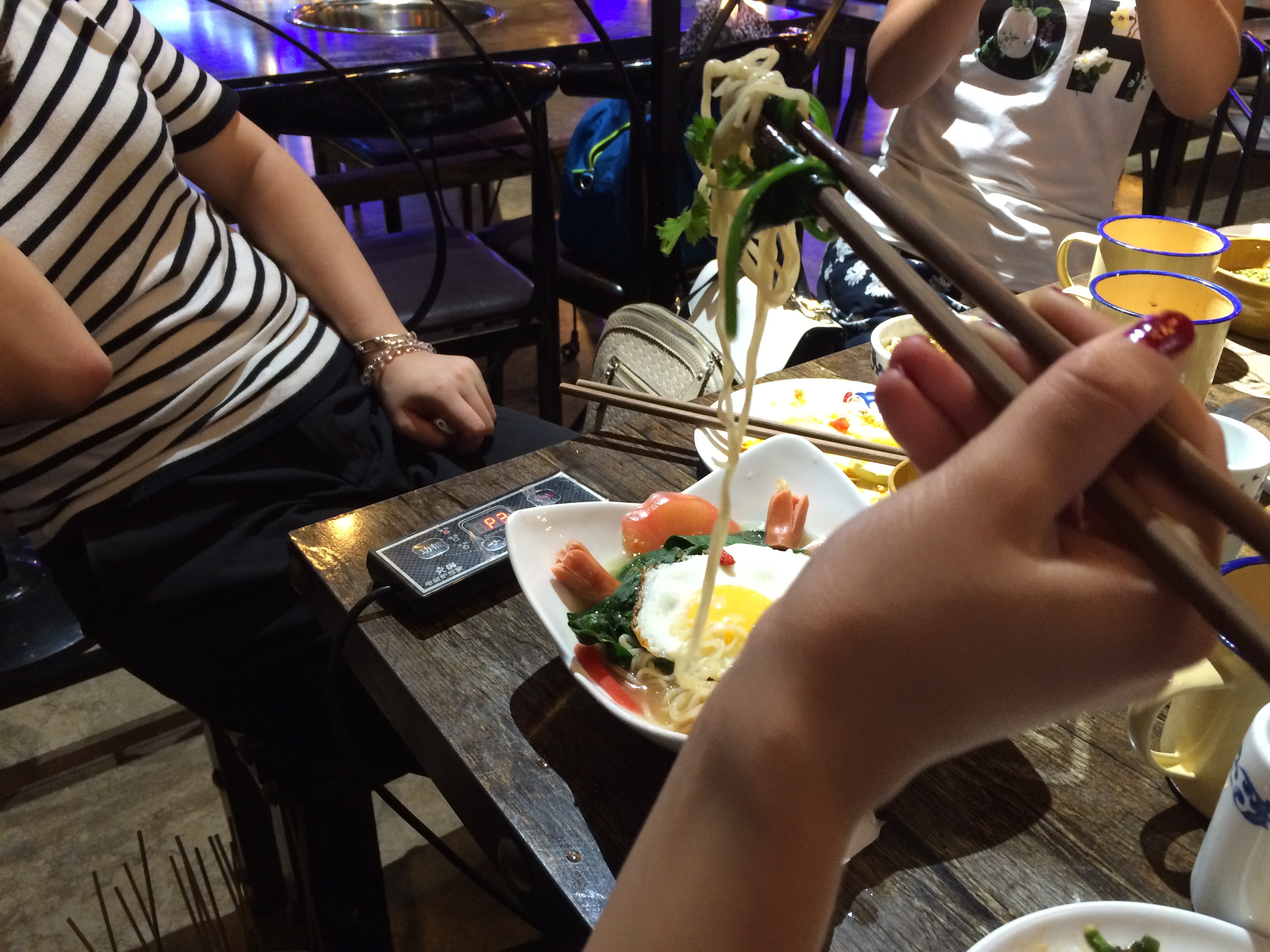
Hospitals, at least in Xi’an, are very modern (although you’ll still see rooms labeled for Chinese Traditional Medicine). The one major difference is the lack of privacy in Chinese hospitals. Once you check in and are taken to the proper doctor, you’ll wait in a line in the doctor’s wing of the hospital. The one time I went to the hospital (for an eczema outbreak, nothing major) my Foreign Affairs Officer’s friend was a nurse there, so she took me right past the line and into a room to the see the doctor. While a group of Chinese patients stood in the room, the doctor looked at my eczema and took notes on his computer. A nurse came in to take a sample of it, all while the same group of people were standing there, waiting to speak to the doctor. It didn’t bother me too much, but it surely was different compared to how doctor’s visits are done in the States.
Work Ethic
Compared to American students, Chinese students work incredibly hard. They’ll typically go to school from 7 in the morning until 5 in the evening, and then attend a private class or training school until their parents can pick them up from work. There’s a huge amount of pressure, especially on young Chinese students, to get a good education and perform well. If you’re interested in learning more about differences between Chinese and American schools, check out one of my older posts.
In the workplace, there’s a very large hierarchy. Engineering and public service jobs tend to have many, many workers doing the job of what we would consider to be done by two people in the States. While we thought this was strange and unnecessary at first, we realized that with close to 1.7 billion people in this country, jobs need to be created, and they certainly are.
In The End...
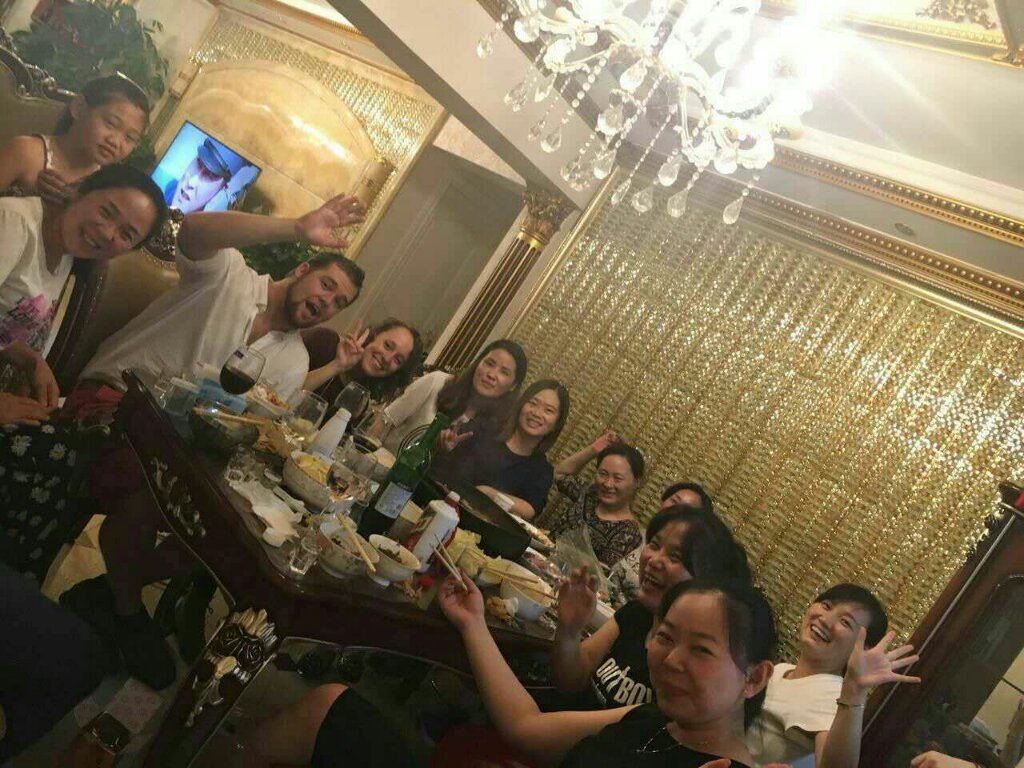
“We are enfleshed spirits; our spirituality is rooted in our physical world. We are most human and most divine when we experience mutual and physical connections across cultural lines, in a way that costs us and changes us.”
CHRISTENA CLEVELAND
I came into this experience with very little expectations. I had no idea what living here would be like. As much as you can research and plan, living and teaching abroad is such a unique experience. No amount of preparation can make you ready for the amazingly wonderful, yet incredibly challenging experience that is living somewhere so different from your home.
But every moment is worth it. To change, to grow, to understand, to live.
Thank you, China— you wonderfully different, exciting, challenging, beautiful, ancient place. You were everything I could have hoped for, and more.



